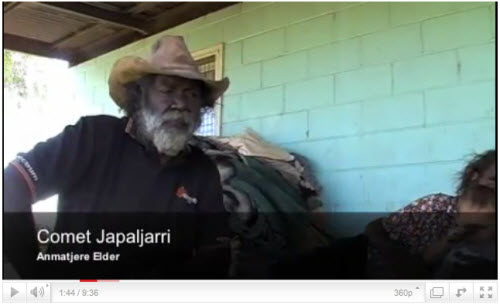Today, workers at the small townships of Kalkaringi and Dagaragu in the Victoria River district of the Northern Territory will be out on strike over their pay and conditions.
The last time that anyone there can remember taking such drastic action was 44 years ago when Vincent Lingiari led the Aboriginal stockmen working for Lord Vestey on a seven-year walk-off that changed the course of Australian industrial history. As Kev Carmody and Paul Kelly so poignantly recorded in their song From Little Things Big Things Grow:
Gurindji were working for nothing but rations
Where once they had gathered the wealth of the land
Daily the pressure got tighter and tighter
Gurindju decided they must make a stand
They picked up their swags and started off walking
At Wattie Creek they sat themselves down
Now it don’t sound like much but it sure got tongues talking
Back at the homestead and then in the town
Lord Vestey and many of the leaders of the Gurindji walk-off are long gone from these parts, but many of the Gurindji people of Kalkaringi and Dagaragu reckon they are back in the bad old days of working for “nothing but rations” and in conditions akin to slavery. And the people of the Victoria River district and beyond know about working for little more than rations and virtual slavery — as Native Affairs Branch patrol officer Bill Harney, writing in his Report on Patrol Western Stations in 1945, reported:
“Imagine such conditions as these. The natives working all day, every day, no wages, just bread and beef with tea and sugar, his wife if young is worked, children also work if old enough… I have no hesitation in saying that native welfare is bad on these stations.” (From Hidden Histories, by Deborah Bird Rose, AIATSIS, 1991.)
In 2010 the people of Kalkaringi and Dagaragu aren’t employed by a vast and notoriously stingy international cattle empire but their local council — and by proxy because of the 2007 NT intervention — the Australian and NT governments.
Three short years ago upwards of 250 people were employed on the Community Development Employment Program (CDEP) at Kalkaringi and Dagaragu (the communities are just a few kilometres apart — separated by the aforementioned Wattie Creek). They worked in a range of locally-owned and operated enterprises including a bakery, a community kitchen, housing and infrastructure, parks, garden and rubbish collection, health clinic, aged care centre, crèche and many others.
Now all that is just about gone, with the bakery struggling, the elderly forced to seek care in Katherine 500km away and the buildings and infrastructure of the thriving employment programs ruined and run down.
How did it come to this? The CDEP program was not perfect but in many, if not most, communities in which it operated it provided local part-time employment, usually providing municipal services with the option to ‘top-up’ worker’s wages and provide local organisations with a revenue stream.
In the Northern Territory about 7,500 participants worked on CDEP before its death knell was rung in the dying days of the Howard government. Despite assurances after the 2007 election, successive federal Labor governments have implemented changes that will see CDEP abolished across the country by mid-2011.
In December 2007, Labor’s Indigenous Affairs Minister Jenny Macklin acknowledged the importance of CDEP for local employment and service delivery:
“CDEP provides important infrastructure and human capacity in remote communities and the federal Labor Government will be building on these assets… The old CDEP will not be simply reinstated… The process of converting CDEP jobs into government service delivery jobs will continue, and we will work with state and territory governments to similarly convert CDEP positions that support state and territory government services.”
A few months ago Jenny Macklin spoke to the ABC’s Fran Kelly in response to a dramatic interview with a NSW CDEP worker who told Kelly of the sorry legacy of Macklin’s changes to the CDEP scheme. Previously happy and productive workers had little incentive now other than to “stay home, and stay drunk” and that the scrapping of CDEP had led to a range of social problems.
KELLY: …What we were hearing there … was that it was this change in policy which exacerbated some of those problems.
MACKLIN: …I am aware that this change has been hard, but also I’m aware … of other places where people have really taken this as a real opportunity for change… We also have had thousands of local governments, state governments and the federal government, who took advantage of Aboriginal people, didn’t pay them proper wages, this is going back over the last 30 years, what we’ve done is said to all governments, ourselves included, proper wages must be paid for public sector jobs, so if you’re a childcare worker, a teacher aid, a ranger, a municipal worker, you should be paid proper wages, not CDEP wages, and we’ve…
KELLY: And all of that’s true, but…
JENNY MACKLIN: Well, just one important point, because around 3000 Aboriginal people, this is across Australia, are now in proper work, that’s federal government work, as a result of the changes that we’ve made, and there are similar numbers now employed by the state, and by local governments, and one of…
But for the people of Kalkaringi and Dagaragu, Macklin’s statement that many Aboriginal people across Australia “are now in proper work” seems little more than cynical rhetoric. John Leemans, a spokesperson for the latest generation of protesters at Kalkaringi and Dagaragu, says Paul Kelly’s lyrics will ring true.
“History is being repeated here, with our people forced to work for rations again,” he told Crikey. “We now have about 40 workers left on CDEP and training programs. Many are working 35-hour weeks but under the new laws they’re working for nothing but a Centrelink payment. It’s worse than working for the dole because half goes onto the BasicsCard and can only be spent at approved stores.”
Macklin’s office tells Crikey the case has been referred to the Fair Work Ombudsman and is currently under investigation. An NT government media officer also advised she had “referred the matter to the appropriate office”.
“CDEP participants who perform work above and beyond their CDEP participation requirements should be paid in wages. It is not acceptable to pay wages in store vouchers,” Macklin’s spokesperson said.
It isn’t just at Kalkaringi and Dagaragu where people are cranky. As the workers at the small town of Ti-Tree, 200km north of Alice Springs on the Stuart Highway, explain in this video, for them the government’s promises of real jobs are illusory:
LES PRESLEY: We just want a proper wages like everybody else. Fair wages. I’ve got three kids to look after. I only get — on BasicsCard $190, plus on my wages that’s [another] $190. And how am I supposed to … look after my kids for two weeks. That’s gonna last maybe five days. I pay my rent — $180 … they told us ‘this rent has changed, you’ve gotta pay more’. They are ripping us off. Right out…
INTERVIEWER: Do you see the Shire here using that CDEP labour for things that they should be paying people proper wages for?
MARK FORDHAM, Employment services worker, Central Desert Shire: Certainly, and that is across the board, not just the Central Desert Shire. They pick on the CDEP guys to do the municipal work to service the communities and the Ti-Tree town itself and they save a lot of money on paying full-time wages.
INTERVIEWER: Do you see work being done here by outside contractors that could be done by local people?
FORDHAM: Every week you see contractors come in. There is always room to put on at least one [local] guy. I’ve failed to see that happen here in Ti-Tree.
PRESLEY: It’s like a slave. [They] are forcing us all to work… They are only thinking one way. We gotta follow them. White people’s way. But they don’t look at the Aboriginal people, what we’ve got here and what we’re gonna leave behind.”
Macklin’s spokesperson told Crikey: “CDEP concentrates on improving job readiness for individuals through activities such as accredited training. The Australian Government wants to ensure that CDEP is no longer seen as a job or a destination, but a stepping stone through training and work readiness.
“As part of the Northern Territory Emergency Response Jobs Package, the Australian Government has converted thousands of CDEP positions to full-time jobs with real benefits such as superannuation and annual leave. In November 2007, 235 Indigenous jobs were funded, compared to 2241 in June this year.”
To date the government has employed 26 previous CDEP participants to deliver Commonwealth government services in the Kalkaringi and Daguragu communities, the spokesperson says. In addition, 65 local government jobs targeted at Indigenous people have been created within Victoria Daly Shire.









An update from the ABC
http://www.abc.net.au/news/stories/2010/10/20/3043659.htm
Group protests against CDEP cuts, intervention
About 150 people are protesting in the Northern Territory community of Kalkaringi against the federal intervention in remote Indigenous communities.
The group are angry at cuts to the Community Development Employment Projects (CDEP) and say the Federal Government has not provided enough jobs to replace it.
Gurindji man Andrew Japanangka Johnson says nothing good has come from the intervention in the last three years.
“Our concern is… not only what the Government is doing to us, but we have a problem right across the Northern Territory and here at Kalkaringi,” he said.
“We try to notify the people that the Government is not treating us good and they took the permit system away from us.”
Indigenous leaders from Wave Hill in the Northern Territory say the federal intervention has not improved conditions for remote Aboriginal people.
Gurindji man Peter Inverway says the intervention promised to deliver new houses, more jobs and better conditions, but he has seen none of that.
“There’s round about 15 to 20 people staying in one house, [a] three bedroom house, and we are just still waiting,” he said.
“We want the CDEP program getting back again on the line, because there were some people working on CDEP getting real wages.”
At least the South Africans provided good healthcare, etc….
I am struggling to say something here that is not defamatory.
I utterly bloody despair. We should be damned ashamed of ourselves as a nation.
If I ever get the chance to take Macklin on personally…
It would take surgery to have me removed.
It worries me that a story like this gets three comments.
Heads up kids and tell everyone you know. Macklin’s department FAHCSIA have released a consultation paper here:
http://resources.fahcsia.gov.au/IEDS/
Closing date for submissions is 1 November although submisions may be recieved later as the election got in the way and delayed things. In Victoria there will be two comunity consultations which are open to all on in Shep and the other in Darebin both in November.
Sto being ashamed and get active.
Read up, get along, cause trouble
A story like this gets three comments because most sane readers would fail to see how welfare reform constitutes ‘slavery’.